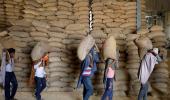'Bilateral trade has suffered seriously because of the growing unrest.'
'There is a standstill on both sides amid the curfew.'

The Bangladesh supreme court's decision on Sunday, July 21, 2024, to abolish most quotas for government jobs has raised hopes of an end to nationwide student protests that have disrupted business operations for Indian companies in the country.
The violent unrest has claimed at least 114 lives and led to a curfew across Bangladesh.
A number of Indian companies with factories in Bangladesh, including Emami and Indofil Industries, have been forced to halt operations due to the turmoil.
Data from the high commission of India in Bangladesh indicates that major Indian companies that have invested in the country include Marico, Emami, Dabur, Asian Paints, Pidilite, Godrej, Sun Pharma, Tata Motors, and Hero MotoCorp.
Further escalation of the crisis could directly or indirectly affect these companies.
Conversely, the unrest might benefit India's textile sector, with companies in Tiruppur expecting a 10 per cent increase in orders due to the long-term impact on US and European brands' confidence in Bangladesh.
The Bangladesh supreme court's appellate division on Sunday overturned a lower court ruling, deciding that 93 per cent of government jobs should be filled based on merit, according to reports.
Kolkata-based Emami, which has a manufacturing unit in Gazipur, Bangladesh, is among the affected businesses.
Company director Prashant Goenka commented: "Our plant is currently shut due to the prevailing environment. Like every other business in Bangladesh right now, we are also impacted. We hope that normalcy returns soon."
Indofil Industries, which exports crop protection chemicals to Bangladesh, has also been hit -- packaging at its factory near Dhaka has stopped.
Consultant Jayanta Chakraborty stated, "The factory is now shut and we cannot pack our existing bulk into stock. Even the import of bulk has been impacted.
"If the situation persists, the crop in Bangladesh will be affected."
The country relies heavily on India and China for crop protection chemicals.
Two FMCG majors operating in Bangladesh, however, reported no interruptions so far but are monitoring the situation closely.
An executive from one firm said: "Right now there has been no impact on our operations. We will continue to monitor how the situation unfolds."
The economic impact of the protests in Bangladesh is estimated at Taka 6,500 crore daily (over Rs 4,600 crore/Rs 46 million), according to a local media report citing the Federation of Bangladesh Chambers of Commerce and Industry.
"Trade has been growing rapidly on the import and export fronts. Bangladesh is strong in garments but the rest of its demand is met by other countries, including India.
"Currently, however, bilateral trade has suffered seriously because of the growing unrest. There is a standstill on both sides amid the curfew," said Sumit Goyal, chairman, CII Eastern Region, International Trade Committee.
Work at major land borders has slowed, impacting trade, and with the shutdown of Internet services, communication between business partners is limited.
Bangladesh is India's biggest trade partner in South Asia, and India is Bangladesh's second-largest trade partner in Asia.
Bangladesh exported $1.97 billion of goods to India in 2023-2024, with total bilateral trade at $14.01 billion.
The Indian automobile sector, with significant exposure to Bangladesh through sales, views the situation as temporary.
Bangladesh is a key destination for Indian auto exports, alongside African and Latin American countries.
Maruti Suzuki, which exports around 18 models to 100 countries, stated that its exports are "well-diversified".
Rahul Bharti, executive director (corporate affairs) at Maruti Suzuki, said: "Our car exports are well diversified across about a hundred countries. A good chunk is to far-off countries in the regions like Latin America; so, we are hardly impacted by the Bangladesh issue."
Similarly, Bajaj Auto, which exports almost 1.5 million units a year, primarily to Africa, described the Bangladesh situation as a "temporary blip".
Its executive director, Rakesh Sharma, expressed hope that the situation in the neighbouring country, though "unfortunate", would be resolved soon.
Tata Motors has a major presence in the country through its dealership networks.
A message to Abdul Matlub Ahmad, chairperson of Nitol Niloy Group, which imports and distributes Tata Motors vehicles in Bangladesh remained unanswered.
Meanwhile, India's textile industry, facing tough competition from Bangladesh, sees an opportunity.
"We expect a 10 per cent rise in our orders due to this crisis," said K M Subramanian, president of the Tiruppur Exporters Association.
With inputs from Sharleen D'Souza
Feature Presentation: Aslam Hunani/Rediff.com












 © 2025
© 2025